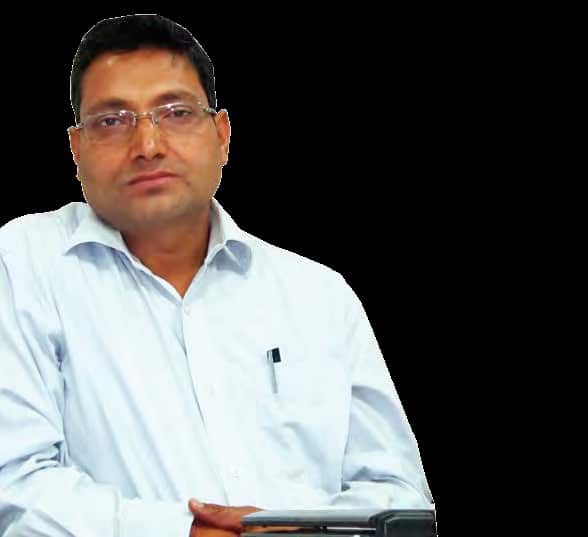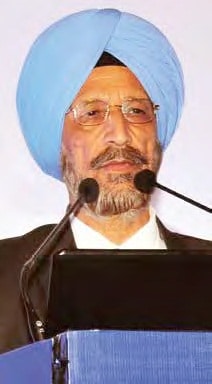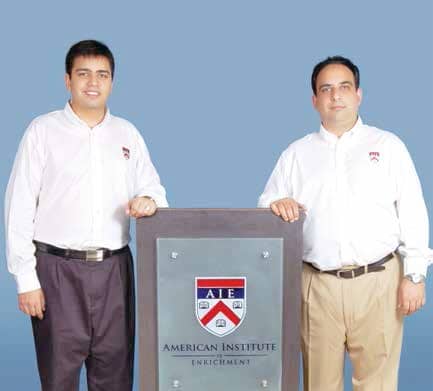 “Odhisa has a number of ITIs and Polytechnic Colleges to help our youth attain the right skills for having gainful employment in the industry of their choice,” says Dr Chandrasekhar Kumar, Commissioner cum Secretary, Employment & Technical Education & Training Department, Government of Odisha
“Odhisa has a number of ITIs and Polytechnic Colleges to help our youth attain the right skills for having gainful employment in the industry of their choice,” says Dr Chandrasekhar Kumar, Commissioner cum Secretary, Employment & Technical Education & Training Department, Government of Odisha
Please tell us about the measures that are being undertaken in the State of Odisha to ensure that the citizens are adequately trained for being employed in the modern industry.
In order to streamline and pay more attention for improving employability of youths through systematic pattern of training, Government of Odisha has created the new department in the name of Employment and Technical Education & Training Department. The basic purpose of this department is to look after the skill upgradation of the youth and provide quality technical education at various levels. Odhisa has a number of ITIs and Polytechnic Colleges to help our youth attain the right skills for having gainful employment in the industry of their choice. In fact, I would like to point out that our educated youth are finding good jobs not only in Odhisa but outside the state also. The work for skill development of our youth is being done through the formal sector, as well as the informal sector. In the formal sector we are strengthening, upgrading and expanding new ITIs and Polytechnic Institutions. In 12th Five year plan, we are targeting more than 80 new ITIs, which will add up to 40,000 seats and will also strengthen the existing ITIs. Also in coming five years we are planning to set up 20 new Polytechnics, which will add 10, 000 more seats. In the informal sector we basically try to cater to the needs of the students who have dropped out of the education system during their schooling period and have not been able to pursue higher education. To these students we provide short duration courses that can enable them to gain skills for different sectors like manufacturing, construction, retail, banking, computers and others.
What steps are being taken to ensure that there is adequate level of interface between the academic community, who are involved in providing skills related training, and the industrial sector?
A healthy level of interface between the academic community and the industry is of great importance. The academic community in the IITs and Polytechnics of Odhisa are interacting with the industry leaders. We do our best to upgrade and reform the courseware and teaching systems in our education institutions by taking into account the changes that are happening in the industrial area. The institutions often approach the important industry bodies for knowing their views on the kind of curriculum that is most suited for skills development. In today’s world the technology being used by the industry is constantly evolving, so it is necessary that the students be imparted training that takes into account the exact requirements of the industry.
“A healthy level of interface between the academic community and the industry Is of great importance”
Tell us about the steps that you are taking to ensure that the educational institutions follow better curriculum.
Government of Odisha has created State Employment Mission that seeks to create synergy in various development sectors in terms of skill development of youths and linkages of employment opportunities. The Mission’s principal task is to formulate sector and trade specific strategies for specialized skill trainings in order to maximize employment opportunities on a sustainable basis in the Dr Chandrasekhar Kumar state supported and private sectors. To fulfil these objectives the Mission seeks to work in close coordination with National Skill Development Mission. Access to education has to be improved, more and more students must be able to take advantage of higher education and technical education. We need to ensure that students from weaker sections of society are also in a position to pursue the education that they desire.
Tell us about the ways by which you are using Information Technology to bring efficiency into the quality of education that is being imparted.
The Information & Communication Technology (ICT) as a tool in education is available to us at this juncture and we wish to fully utilize it to enhance the current enrolment rate in Higher and Technical Education. We are having a number of programs for delivering education through ICT. We are part of Government of India’s National Mission on Education through ICT. Under this Mission, a proper balance between content generation, research in critical areas relating to imparting of education and connectivity for integrating our knowledge with the advancements in other countries is to be attempted. We are also part of a programme under which we will be able to broadcast lectures online in polytechnic colleges. Capacity building through knowledge empowerment of our youth is necessary to sustain a high growth rate of our economy.
| MISSION OF EMPLOYMENT & TECHNICAL EDUCATION & TRAINING DEPARTMENT |
| • Serve the public through the promotion and advancement of Technical Education and vocational Training, establish and operationalize policies, regulations and procedures for setting and maintaining standards and quality of technical education and Government on the strategic development of the sector • Upgrade technical institutes into Centres of Excellence of world standard through user friendly course curricula • Promote quality and innovation in technical education and training sector. • Assist technical institutions to achieve and maintain high quality of education and training; • Consult and assist in the development and advancement of technical education and vocational training in the State in a financially selfsustaining manner. • Anticipate and prepare for the changing environment and the future needs in the pursuits of technological advancements. • Manage the operations and resources to be effective and fiscally responsible. • Substantial growth of technical education and training sector with quality to match the national average |
What kind of impact are the initiatives of your department having on improving the employability of the youth in the state?
There is lot of improvement in employability of the youth in the state and that is also having a positive impact in the overall economy of the state. Availability of skilled manpower is most important for achieving the targets of higher productivity, accuracy, consistency and thus competitiveness for domestic and other sectors micro, small and medium manufacturing enterprises as well as process sector industries. Orissa is playing host to the biggest new names in the business world in the field of steel, power, aluminium, and power cement among others. The presence of such strong industrial players distinctly provides required synergy for human capital investment through establishment of technological universities, IIT, IIIT, IIM level institution to boost Research & Development (R&D) activities and providing managerial/supervisory /skill workforce to the emerging labour market.
Please shed light on the main objectives of the State Employment Mission?
Government of Odisha has created State Employment Mission that seeks to create synergy in various development sectors in terms of skill development of youths and linkages of employment opportunities The Mission’s principal task is to formulate sector and trade specific strategies for specialized skill trainings in order to maximize employment opportunities on a sustainable basis in the state supported and private sectors. To fulfil these objectives the Mission seeks to work in close coordination with National Skill Development Mission.
Tell us about the initiatives that you are taking for skill development of female students. The State Government have reserved 30 percent of seats in all the Government ITI for women candidates. Nine new girls hostel have been sanctioned ST & SC Development Department in the ITIs to accommodation of women trainees. Short term training programme have been taken up under State Employment Mission, W&CD Department, H&UD Department in ITIs and Polytechnics.







 The integration of both industry and academia is extremely important for the overall development of society. This will ensure that research at the universities is relevant for the industry
The integration of both industry and academia is extremely important for the overall development of society. This will ensure that research at the universities is relevant for the industry
 statues of many institutions which is a challenging task to accomplish.
statues of many institutions which is a challenging task to accomplish. Expect rise in the cyber security jobs in India in coming days. Big IT companies in India – viz. TCS, Infosys, Wipro, Cognizant and others may soon begin looking for cyber security experts & ethical hackers. TCS’s ex-CEO, Mr. S Ramadorai, who currently heads NSDA aka National Skills Development Agency has said that the demand for security experts is expected to growing coming days. He believes hiring and training young professionals to work in the domain is the need of the time. The number of cyber attacks has gone up significantly in the recent times – hackers from China & the United States have become more sophisticated in the quality of their attacks. It’s been found that an average cyber hacker remains undetected for about 400+ days. Big Internet companies like Google, Twitter, Facebook, Yahoo and others have already began offering huge prizes for reporting security bugs in their systems. The bigger question is – preparedness of the people who want to make a career in cyber security. Be aware that you’ll need a special training – going much beyond the so called ‘ethical hacking’ courses which have mushroomed in every corner. The salaries in the domain will always be higher than the regular IT jobs – provided the candidates know the job. If you are an aspiring ethical hacker or want to make a career in the cyber security domain; I’d strongly advise you to keep updating your knowledge and start reading as much as you can about computer security. As we all know, a cyber security job comes under the Information technology (IT) and IT industry is mainly driven by private sector. I know better because my home town Bangalore is the hub of IT industry. But why would you prefer a cyber security job in Sarkari Naukri, when there are so many vacancies in private companies. Well! I leave up to you, why you want a Sarkari Naukri but not private sector jobs.
Expect rise in the cyber security jobs in India in coming days. Big IT companies in India – viz. TCS, Infosys, Wipro, Cognizant and others may soon begin looking for cyber security experts & ethical hackers. TCS’s ex-CEO, Mr. S Ramadorai, who currently heads NSDA aka National Skills Development Agency has said that the demand for security experts is expected to growing coming days. He believes hiring and training young professionals to work in the domain is the need of the time. The number of cyber attacks has gone up significantly in the recent times – hackers from China & the United States have become more sophisticated in the quality of their attacks. It’s been found that an average cyber hacker remains undetected for about 400+ days. Big Internet companies like Google, Twitter, Facebook, Yahoo and others have already began offering huge prizes for reporting security bugs in their systems. The bigger question is – preparedness of the people who want to make a career in cyber security. Be aware that you’ll need a special training – going much beyond the so called ‘ethical hacking’ courses which have mushroomed in every corner. The salaries in the domain will always be higher than the regular IT jobs – provided the candidates know the job. If you are an aspiring ethical hacker or want to make a career in the cyber security domain; I’d strongly advise you to keep updating your knowledge and start reading as much as you can about computer security. As we all know, a cyber security job comes under the Information technology (IT) and IT industry is mainly driven by private sector. I know better because my home town Bangalore is the hub of IT industry. But why would you prefer a cyber security job in Sarkari Naukri, when there are so many vacancies in private companies. Well! I leave up to you, why you want a Sarkari Naukri but not private sector jobs.
 Communication Skills and Computer Skills to prepare them better for challenges of school education and enable them to develop skills essential for increasingly competitive world of higher studies. Station- e Complete Skills Solution has been conceptualized to address the issue of school education with respect to equipping our school students to compete at national and international levels so that we find our rightful place in not only in PISA ratings but also subsequently in higher education ratings, and any other rating that may pose a challenge to the young Indian minds.
Communication Skills and Computer Skills to prepare them better for challenges of school education and enable them to develop skills essential for increasingly competitive world of higher studies. Station- e Complete Skills Solution has been conceptualized to address the issue of school education with respect to equipping our school students to compete at national and international levels so that we find our rightful place in not only in PISA ratings but also subsequently in higher education ratings, and any other rating that may pose a challenge to the young Indian minds. By Grace Pinto, Managing Director, Ryan International Group of Schools
By Grace Pinto, Managing Director, Ryan International Group of Schools Education at Doon Public School epitomizes exigent, engaging and inevitably satisfying curriculum incorporated with co-curricular activities so as bring the innate potential of the child to groom him to face the challenges with zeal and zest. The aim of education is to make the school a rewarding journey which makes them the leaders of tomorrow who can shoulder the responsibility infused with immense confidence and commitment.
Education at Doon Public School epitomizes exigent, engaging and inevitably satisfying curriculum incorporated with co-curricular activities so as bring the innate potential of the child to groom him to face the challenges with zeal and zest. The aim of education is to make the school a rewarding journey which makes them the leaders of tomorrow who can shoulder the responsibility infused with immense confidence and commitment.











